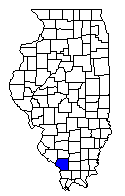
To the land that has sent to our country so many of her best sons, and
that has given that tinge to the stream of America life that renders it
healthy and wholesome, in other words, to Germany we owe the presence among
us of Daniel Baldwin Fager, who has done so much for education in Southern
Illinois, and in whom may be traced that clarity of intellect and steadiness
of purpose that characterizes the land of his ancestry. He has given his
whole life to the cause that he holds closest to his heart, and in the
remarkable progress that the science of education has made in the past
decade or so Mr. Fager has always been in the fore front. In addition to his
scholarly attainments he has much tact and the personality that charms both
children and grown people, so as a superintendent he has been remarkably
successful, and outside of his profession he numbers hosts of friends.
Daniel Fager is not a German by birth, having been born, on the 15th of
August, 1859, in Jackson county, Illinois, but his father, Sebastian Fager
was born in Germany, at Baden. The latter came to America about 1850, and
settled in Jackson county, where he engaged in farming, in which pursuit he
spent all of his life. He rapidly became accustomed to the changed
conditions under which he was to live, and soon became an ardent devotee of
the Republican mode of thought, though he never entered actively into
political life. Both he and his wife were members of the Lutheran church. He
was married before coming to this country to Mary Mauer, who was of French
descent. Eight children were born to this couple, of whom Daniel is the
youngest. Of these children only four are now living. The father died in
1889, at the age of eighty, but, the mother passed away many years before,
in 1862, leaving Daniel a little three year old toddler.
The early
life of Daniel Fager was spent on the farm in Jackson county, and the
education that he received in the county schools caused him to realize the
deficiencies that were glaringly evident in the schools of his youth. He
also studied some time in the village schools of De Soto. After acquiring
more than he at the time realized from this preparatory training he entered
the Southern Illinois Normal and was graduated from this school in 1883. The
two years previous to his entry into the normal school he spent in teaching
a country school, so on his graduation he was not only equipped with a
diploma but also with experience, and he was immediately .offered a
principalship. This first position was at Galatia, Illinois, and he remained
here for two years. He then accepted a similar position at Anna, and his
stay here was of the same length. Shawneetown then elected him their
superintendent of schools, and he accepted the post, which he held for a
year, resigning to become superintendent of the Collinsville schools. The
people of the latter place had the good fortune to hold him for six years,
during which the schools of the town made great strides forward, but
Assumption finally secured his services, though he only remained for one
year. From Assumption he went to Salem, as superintendent of schools,
remaining four years. At the end of this time he took the principalship of
the Mount Vernon city schools, holding this office for a year, before coming
to Vandalia. He has been at Vandalia for five years, and the citizens of the
town can only hope that he will make a longer stay with them than he has at
the other places where he has held executive positions.
There are
eighteen teachers engaged in the Vandalia schools and the responsibility for
their work rests upon the shoulders of the superintendent. The high school
has a four year course, and is fully accredited, a diploma from the school
being accepted by the University of Illinois in lieu of an examination. The
enrollment of the high school has increased since Mr. Fager took charge of
it from seventy -five to one hundred and twenty -nine.
While
attending to the education of others, Mr. Fager has followed the principle
that the teacher should always be the student, and to that end has not only
read widely but has taken post graduate work at the University of Illinois,
having spent in all four summer sessions at the University. An evidence of
his popularity and ability as a teacher, as well as the progressive modes of
thought which he has adopted, is given by the frequency with which he is
invited to give courses or talks at the various institutes that have been
held in the counties of Marion, Jackson, Randolph, Saline and Jefferson.
In 1887 Mr. Fager was married to Fannie D. McAnally, the daughter of Dr.
J. F. McAnally, of Carbondale, Illinois. One son was born to them, Frank D.
Fager, who is now a junior at the University of Illinois, where he is
pursuing the electrical engineering course.
Mr. Fager has joined
that recent movement in politics with which most thinking men are in
sympathy, at least in this section of the Union, that is, he is a
Progressive Republican. His religious affiliations are with the Methodist
Episcopal church, and he takes considerable interest in the affairs of the
fraternal world, being a member of the Odd Fellows and of the Knights of
Pythias.
Extracted 11 Nov 2018 by Norma Hass from 1912 A History of Southern Illinois, by George W. Smith, volume 3, pages 1157-1158.
Randolph |
Perry | Franklin |
Perry MO |
 |
Williamson |
| Union |


